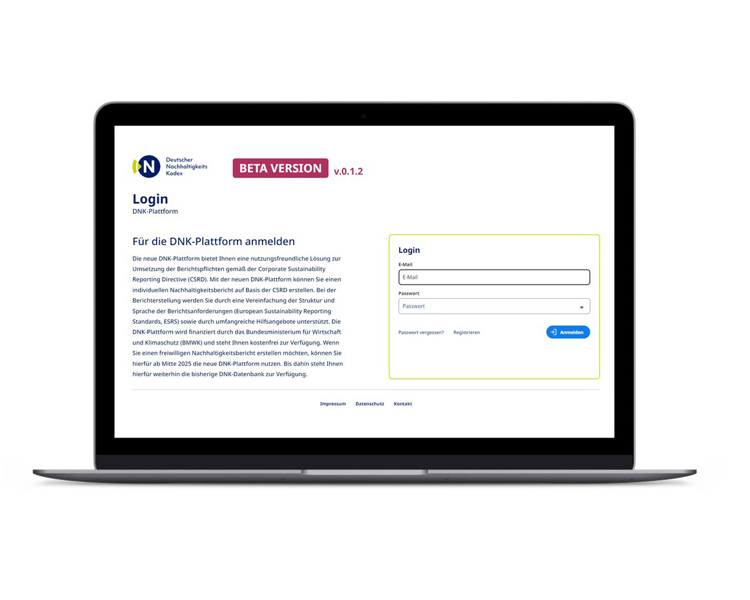DNK Platform: Your free tool for sustainability reporting

Step by step to your CSRD-compliant sustainability report
At the heart of our Sustainability Code services is the DNK Platform – a free software solution for efficiently creating your digital sustainability reports. It guides you step by step through the reporting process, saving you time and effort.
The DNK Platform is structured in modules for the different groups of companies. The first module, for those subject to mandatory reporting, was launched in early 2025 (ESRS Set 1). A further module, for companies reporting voluntarily, will follow in September 2025 (VSME). Plus, we offer sector-specific options such as the “Zukunfts-Kompass Handwerk”, the DNK module for trade and craft businesses.
ESRS Set 1 or VSME module? Your tailored list of questions for your report
When you create a new report, you simply select whether your company is subject to mandatory reporting (ESRS Set 1 module) or is reporting voluntarily (VSME module). You then upload the results of your materiality assessment – non-material topics are hidden. You can choose whether to add voluntary content or not. This way, you get a customised list of questions specifically tailored to your company.
By the way, if you have already submitted a DNK declaration and are registered in the old DNK database, your data will automatically be transferred to the new DNK Platform.
DNK Checklists: The ESRS data points clearly structured and in plain language
When you create your report, you will be shown all the data points from ESRS Set 1 that are material for you and all data points of the VSME. We have formulated the data points in simplified language for you and arranged the report contents in 20 topics for ESRS Set 1 and 10 topics for VSME. So now you will find all the information you need to declare on each report item in one place. Mandatory and voluntary content can be instantly distinguished thanks to colour coding. Further information on the DNK Checklists can be found here.
Integrated help along the way
We offer an extensive toolkit to give you the best possible support: usage tips, definitions, calculation examples, tutorials and sector-specific information are all integrated directly into the DNK Platform. And our intelligent assistant shows you exactly what you need at any given point.
All features of the free DNK Platform at a glance
In this short video, we introduce you to all functions and assistance features of the new Sustainability Code platform. It offers you an intuitive and efficient way to prepare your sustainability report in accordance with the Corporate Sustainability Reporting Directive (CSRD).
Check the status of your sustainability report at any time
Thanks to the integrated progress indicator, you can check the status of your sustainability report at any time – from the general overview to individual chapters and aspects. This shows you exactly how far along you are and what still needs to be done.
Make sustainability reporting teamwork
Invite colleagues to work on the report with you. You can assign individual editing rights, and allocate specific tasks via the comment function for efficient collaboration.

Releasing and publishing your completed sustainability report is simple
You can export the finished report in various formats (as a Word document or in PDF or XBRL format) – for example to your auditors.
To meet the growing demand for ESG data and gradually replace individual requests for information, we are also working on interfaces for secure data transfer – such as to banks or insurance companies.
You also have the option to publish your report on the DNK Platform if you wish.
Check for formal completeness
Reports that are created in our VSME module undergo a check for formal completeness directly on the platform – performed by our expert reviewers.
Positive response from businesses
Since the beta version went live in January 2025, followed by the official launch in March, our platform is has really taken off: over 3,000 companies and more than 5,000 users registered in the first half of 2025. Because the platform shows you step by step which data points you have to report on and in what form, businesses tell us they find it incredibly helpful. It means they can focus their full attention on the content and not have to worry about the formal requirements.

As far as I can tell, it is very user-friendly. It is very easy to navigate through the DNK step by step.
Lucy SchweingruberWhat’s still to come
We continue to develop the DNK Platform – with the aim of making your reporting even simpler. In future, for example, an AI chatbot will be on hand to assist you with your reporting. And of course, all changes to the CSRD – such as from the draft of the EU Omnibus package from 26 February 2025 – will be integrated into the platform once published.

